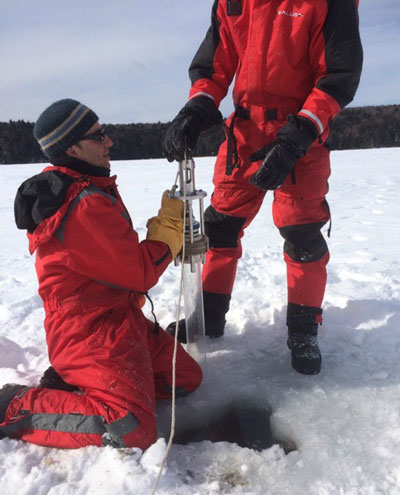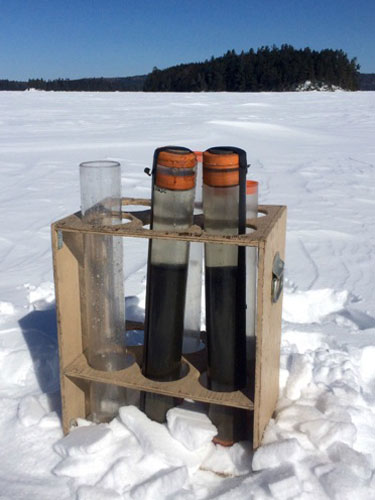Events Calendar
Current Weather
Sediment Coring the Bottom of Dickson Lake - Algae Bloom Update 3
Ontario Parks has issued an update on the Dickson Lake and Lake Lavieille algae bloom that closed both lakes to public travel in September 2014. For additional information see the original news bulletin called Dickson Lake and Lake Lavieille Closed to Travel and Camping - Algae Bloom issued September 25, 2014, plus a second update issued on Febrary 17, 2015.
Ontario Parks, the government organization responsible for the management of Algonquin Provincial Park, is reporting...
 "In an ongoing effort to understand the algae bloom that occurred on Dickson Lake this past fall, sediment core samples were collected from the bottom of Dickson Lake on March 5, 2015. These samples will be analyzed to gain insights into the history of Dickson Lake. The sediment may be representative of the past 150 years. This analysis may provide useful insights into the presence or frequency of past blooms, and identify any common conditions that may have facilitated a bloom.
"In an ongoing effort to understand the algae bloom that occurred on Dickson Lake this past fall, sediment core samples were collected from the bottom of Dickson Lake on March 5, 2015. These samples will be analyzed to gain insights into the history of Dickson Lake. The sediment may be representative of the past 150 years. This analysis may provide useful insights into the presence or frequency of past blooms, and identify any common conditions that may have facilitated a bloom.
Water samples were collected in conjunction with the sediment core samples. These samples were collected to analyze the current winter conditions of the lake, namely: (1) the chemistry of the lake, (2) the make-up of the plankton community and, (3) the presence, if any, of toxins associated with algal blooms. These parameters can then be compared to data collected from previous years. Analysis of the March 5 samples did not detect the genus, Anabaena. This was the genus of blue-green algae responsible for the bloom in 2014. Samples collected from Dickson Lake in 1983 contained Anabaena which suggests that the presence of this blue-green algae may be a normal part of Dickson Lake's plankton community. No toxins or microcystins were found.
A profile of dissolved oxygen levels throughout the water column was also determined on March 5. Oxygen concentrations in lakes have been shown to decline following an algae bloom. The levels may be at their lowest during the winter when ice cover inhibits atmospheric oxygen from dissolving into the lake. As well, ice cover and snow may stop sunlight from reaching aquatic organisms that produce oxygen through photosynthesis. A decline in oxygen may negatively impact some life forms, including fish. The profile for Dickson Lake did not show an abnormal decline in oxygen when compared with past winter profiles. It is unlikely that low oxygen levels will have any negative effects on the local fish population.
 The algae bloom of 2014 appeared to originate in Dickson Lake. Although the same type of blue-green algae was found in Lake Lavieille, it is believed that this was the consequence of water flowing into Lake Lavieille from Dickson Lake. It is not thought that algae bloomed in Lake Lavieille. This is why the sampling work of March 5, 2015 was focused on Dickson Lake and not Lake Lavieille.
The algae bloom of 2014 appeared to originate in Dickson Lake. Although the same type of blue-green algae was found in Lake Lavieille, it is believed that this was the consequence of water flowing into Lake Lavieille from Dickson Lake. It is not thought that algae bloomed in Lake Lavieille. This is why the sampling work of March 5, 2015 was focused on Dickson Lake and not Lake Lavieille.
In the most recent visit to Dickson Lake, no cause for any further concern was found. Unless conditions change, all signs suggest that Dickson Lake has returned to normal and is safe for recreation and public travel.
Park visitors are reminded that they should not drink untreated lake water. If you suspect the presence of algae, do not drink even treated water. Visitors are asked to report signs of any potential blooms to park staff at the nearest access point or permit office.
Ontario Park's staff will be monitoring lakes this season for any abnormal presence of algae. Monitoring and analysis will also continue on Dickson Lake in 2015. Updates will be provided through The Friends of Algonquin Park's website."
Related Information
- News Bulletin: Dickson Lake and Lake Lavieille Closed to Travel and Camping - Algae Bloom issued September 25, 2014
- News Bulletin: Dickson Lake and Lake Lavieille Algae Bloom Update issued February 17, 2015
- Algonquin Park Canoe Routes Map
- Camping in the Backcountry
Reserve your developed or backcountry campsite for your next visit.
Share your passion for Algonquin Park by becoming a member or donor.
Special regulations for Algonquin's special fishery.









